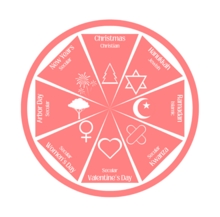Portal:Holidays
| Main page | Calendar | Categories |
Introduction

A holiday is a day or other period of time set aside for festivals or recreation. Public holidays are set by public authorities and vary by state or region. Religious holidays are set by religious organisations for their members and are often also observed as public holidays in religious majority countries. Some religious holidays, such as Christmas, have become secularised by part or all of those who observe them. In addition to secularisation, many holidays have become commercialised due to the growth of industry.
Holidays can be thematic, celebrating or commemorating particular groups, events, or ideas, or non-thematic, days of rest that do not have any particular meaning. In Commonwealth English, the term can refer to any period of rest from work, such as vacations or school holidays. In American English, the holidays typically refers to the period from Thanksgiving to New Year's, which contains many important holidays in American culture. (Full article...)
Selected article

Earth Day is a name used by two different observances held annually in the (northern) spring, both intended to inspire awareness of and appreciation for the Earth's environment. Earth Day is in the public domain and open to all persons to shape. Some grassroots Earth Day organizers seek to move the date of the observance to the summer solstice, to take advantage of the warm temperatures in the Northern Hemisphere (where most people live) to create greater participation.
The equinoctial Earth Day, also International Earth Day, is celebrated on the vernal equinox to mark the precise moment that spring begins in the Northern Hemisphere and autumn in the Southern Hemisphere. John McConnell first introduced the idea of a global holiday called Earth Day at a UNESCO Conference on the Environment in 1969, the same year that he designed the Earth flag. The first Earth Day proclamation was issued by San Francisco Mayor Joseph Alioto on March 21, 1970.
Selected biography

Frosty the Snowman is a popular Christmas song written by Walter E. "Jack" Rollins and Steve Nelson and recorded by Gene Autry and the Cass County Boys in 1950. Like Jingle Bells and several other songs about winter, Frosty the Snowman is considered to be a Christmas song despite not mentioning Christmas at all. It was written after Gene Autry recorded "Rudolph the Red-Nosed Reindeer" and the single sold 2 million copies.
Frosty the Snowman is also a thirty-minute animated television special based on the popular song of the same title. The program, which first aired in 1969, was produced for television by Rankin/Bass and featured the voices of comedians Jimmy Durante as narrator and Jackie Vernon as the title character.
Things you can do
 |
Here are some tasks awaiting attention:
|
Selected image

Credit: commons:User:David.Monniaux
Bastille Day Military Parade of July 14, 2006 on the Champs Élysées in Paris, France.
Selected quote
| “ | If they have no bread, then let them eat cake! | ” |
| — Marie Antoinette | ||
Related portals
WikiProjects
Major topics
Holidays - Anniversaries - Civic holidays - Federal holidays - Hallmark holidays - Heroes' Day - National holidays - Observances - Holidays by Country - Victory Days
Lists: Christmas carols - Christmas dishes - Hindu festivals - Holidays by country - Objects dropped on New Year's Eve - Winter festivals
Religious festivals: Buddhist festivals - Christian festivals - Islamic festivals - Neopagan holidays - Hindu festivals - Jain festivals - Jewish holidays - Roman festivals
Secular holidays: April Fools' - Armed Forces Day - Boss's Day - Children's Day - Cinco de Mayo - Commonwealth Day - Earth Day - Father's Day - Grandparents' Day - Halloween - HumanLight - Labor Day - May Day - Mother's Day - Naadam - Pi Day - Presidents' Day - Spring break - Teachers' Day - Thanksgiving - Yom Yerushalayim
Winter holidays: Chinese New Year - Christmas - Dōngzhì - Eid ul-Adha - Festivus - Groundhog Day - Hanukkah - Kwanzaa - New Year's Eve - Shab-e Chelle - Sol Invictus - Twelfth Night - Valentine's - Winter Solstice - Yule
Associated Wikimedia
The following Wikimedia Foundation sister projects provide more on this subject:
-
Commons
Free media repository -
Wikibooks
Free textbooks and manuals -
Wikidata
Free knowledge base -
Wikinews
Free-content news -
Wikiquote
Collection of quotations -
Wikisource
Free-content library -
Wikiversity
Free learning tools -
Wiktionary
Dictionary and thesaurus










